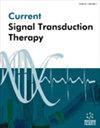High Throughput Screening of Focused Virtual Library and Synthetic Protocols of Marine Sponge Derived Hymenialdisine Analogs as Potential Abnormal Signal Transduction Inhibitors
Q3 Medicine
引用次数: 0
Abstract
Cellular proliferation is the process of mitotic cell division by which a cell grows, replicates its DNA and divides to produce two daughter cells. Mitotic cycle is regulated by cyclin-dependent kinases (CDKs) and tyrosine proteine kinases (TPKs). CDKs are binary proline-directed serine-threonine-specific protein kinases consisting of a positive regulatory subunit known as cyclin. The role of the CDKs is to control cell cycle progression through phosphorylation of proteins that function at specific cell cycle stages [1]. Tyrosine kinase catalyzes phosphorylation of tyrosine residues in proteins. The phosphorylation of kinase residue results in many signal transduction cascades wherein extracellular signal is being transmitted by cell membrane receptors such as EGFr/FGFr/PDGFr/C-src. Extra cellular signal enters into the nucleus to cause genetic mutation which further leads to the progression of cancer [2]. CDKs and TPKs can regulate the checkpoints. Their control mechanism ensures that everything is ready for DNA synthesis and mitosis phase division; thereafter complete cell division. Dispute of the checkpoints may lead to abnormal signal transmission that may produce oncogenic cell signaling and cancer. Abnormal signal transduction may be produced by the different mutagens such as virus, bacteria and chemical [1].高通量筛选聚焦虚拟文库和海绵体海绵体类似物作为潜在异常信号转导抑制剂的合成方案
细胞增殖是有丝分裂细胞的过程,细胞生长、复制DNA并分裂产生两个子细胞。有丝分裂周期由细胞周期蛋白依赖性激酶(CDKs)和酪氨酸蛋白激酶(TPKs)调节。CDKs是一种二元脯氨酸导向的丝氨酸-苏氨酸特异性蛋白激酶,由一种被称为细胞周期蛋白的正调控亚基组成。CDKs的作用是通过磷酸化在特定细胞周期阶段发挥作用的蛋白质来控制细胞周期进展[1]。酪氨酸激酶催化蛋白质中酪氨酸残基的磷酸化。激酶残基的磷酸化导致许多信号转导级联,其中细胞外信号通过细胞膜受体如EGFr/FGFr/PDGFr/C-src传递。细胞外信号进入细胞核引起遗传突变,进一步导致癌症的进展[2]。CDK和TPK可以调节检查点。它们的控制机制确保一切都为DNA合成和有丝分裂阶段的分裂做好了准备;之后完成细胞分裂。检查点的争议可能导致异常信号传输,可能产生致癌细胞信号和癌症。病毒、细菌和化学物质等不同的诱变剂可能会产生异常的信号转导[1]。
本文章由计算机程序翻译,如有差异,请以英文原文为准。
求助全文
约1分钟内获得全文
求助全文
来源期刊
CiteScore
1.70
自引率
0.00%
发文量
18
审稿时长
>12 weeks
期刊介绍:
In recent years a breakthrough has occurred in our understanding of the molecular pathomechanisms of human diseases whereby most of our diseases are related to intra and intercellular communication disorders. The concept of signal transduction therapy has got into the front line of modern drug research, and a multidisciplinary approach is being used to identify and treat signaling disorders.
The journal publishes timely in-depth reviews, research article and drug clinical trial studies in the field of signal transduction therapy. Thematic issues are also published to cover selected areas of signal transduction therapy. Coverage of the field includes genomics, proteomics, medicinal chemistry and the relevant diseases involved in signaling e.g. cancer, neurodegenerative and inflammatory diseases. Current Signal Transduction Therapy is an essential journal for all involved in drug design and discovery.

 求助内容:
求助内容: 应助结果提醒方式:
应助结果提醒方式:


